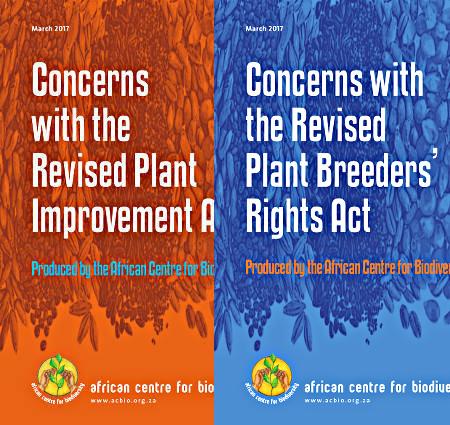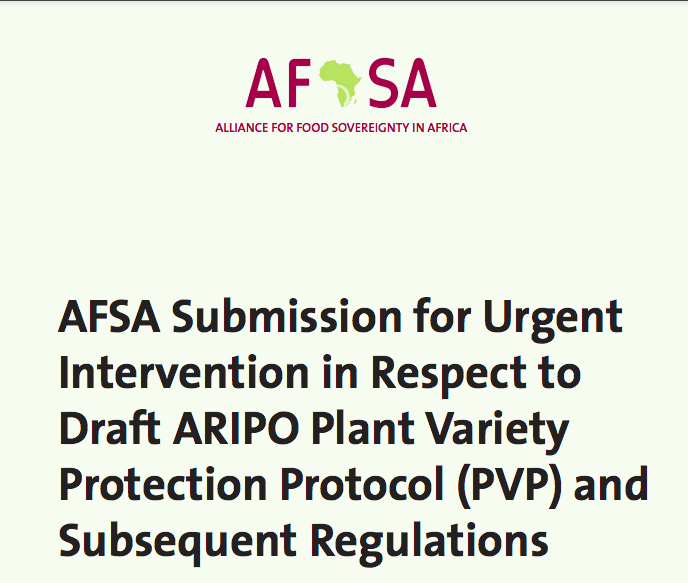Latest Resources

18 July 2017
GM Cotton push in Swaziland: Next target for failed Bt cotton
This paper examines the application of the Bt cotton field trials currently underway in Swaziland. This is situated within the broader wave of GM application and trials across the continent, along with the weakening of national biosafety regulations, as part of the GM push across Africa. This paper is based on research on the Swaziland […]

25 May 2017
South Africa and 2,4 D stacked GM maize: biosafety, socio-economic risks
In 2015–2016 Dow AgroSciences Southern Africa (Pty) Ltd performed field trials on maize tolerant to 2,4-D (event DAS-87078-9) and stacked varieties carrying not only 2,4-D tolerance, but also glyphosate tolerance and/or Bt insectidal toxins. The trials are on going in 2017. The trials follow the approval for import for food, feed and processing in 2012, […]

27 March 2017
Briefings on the revision of South Africa’s seed laws: Entrenching an unjust and unsustaina...
As we continue to engage and mobilise around the seed policy and legislation revisions, ACB has developed 2 easy-to-read documents outlining the central concerns and possible alternative directions for seed policy to move in South Africa. Despite the public interest to support an equitable seed system, the Plant Improvement and Plant Breeders’ Rights Bills, create […]

28 July 2016
ACB Preliminary comments on Draft Regulations Implementing the Arusha Protocol for the Protection...
Draft Regulations for the implementation of the African Regional Intellectual Property Organisation’s (ARIPO’s) Arusha Protocol for the Protection of New Plant Varieties (Arusha Protocol), were considered for adoption in June 2016. The proposed regulations included provisions designed to intimidate and force seed processors, seed suppliers, government certification officers and even farmers’ organisations to police and […]

30 June 2015
What next after a ban on glyphosate – more toxic chemicals and GM crops?
This briefing calls for a ban on glyphosate and that other toxic herbicides, such as 2,4-D and dicamba must similarly also come under urgent review and that adequate measures must be put in place to ensure that more toxic chemicals do not replace glyphosate.

23 July 2014
Peddling for Profits: Pioneer Hi-Bred’s redundant rootworm-resistant GM maize coming soon t...
In this briefing, we show how SA’s biosafety regulatory system favours profits over sound biosafety practise as the regulators have authorised field trials of a GM maize variety to combat a pest, the corn root worm that does not exist in SA at all and will not, for 100 years!! Read here.

11 June 2014
AFSA Makes Small Gains for Farmers’ Rights in Draft SADC PVP Protocol
AFSA members participated at a SADC Regional Workshop that took place 13-14 March 2014, in Johannesburg, South Africa. The aim of the workshop was to review the draft SADC PVP Protocol. After marathon, highly contentious and difficult discussions, AFSA members were able to persuade member states to amend key provisions in the draft SADC PVP […]

20 May 2014
GM Contamination, Cartels and Collusion in South Africa’s Bread Industry
This briefing paper exposes the high levels of GM soya in South Africa’s popular white bread brands and reveals how just four companies – Tiger Brands, Pioneer Foods, Premier Foods and Foodcorp control the Wheat-to-Bread value chain. This value chain feeds into another concentrated retail food market controlled by Shoprite/Checkers, Pick n Pay, Woolworths and […]

5 November 2013
GM Maize: lessons for Africa – Cartels collusion and control of South Africa’s staple...
This is a briefing about power and control in our food system, focusing chiefly on South Africa’s staple food, maize. It shows how a select group of companies, including Tiger Brands, Pioneer and Premier Foods commandeer the entire maize value chain and continue to squeeze the poorest South Africans. These corporate giants are now glancing […]

15 October 2012
Setting the record straight on the Seralini GM maize rat study: why the SA government must urgent...
In this briefing we respond to the main criticisms of the Seralini GM maize rat study (which have been appearing ad nauseum in the world’s mainstream media); provide some background as to the importance of the NK603 GM maize to the biotechnology industry (and hence the scale of their reaction); and place the attacks on […]
